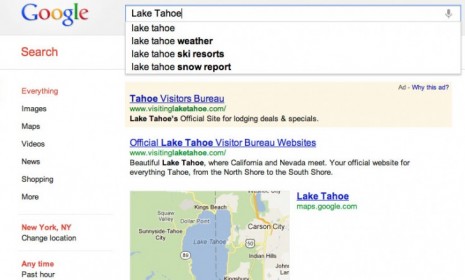Google's 'dramatic' search overhaul: How it affects you
The world's dominant search engine is going to try to actually answer your questions, not just serve you pages upon pages of blue links

A free daily email with the biggest news stories of the day – and the best features from TheWeek.com
You are now subscribed
Your newsletter sign-up was successful
Google powers two-thirds of the world's internet searches, so when it announces big changes, people pay attention. And according to The Wall Street Journal, Google is giving its "tried-and-true web-search formula" a makeover that's "among the biggest in the company's history." Instead of just spitting back a page of keyword-driven blue links, Google is aiming for something closer to artificial intelligence, trying to understand what web searchers are asking for and providing actual answers. When the changes kick in, Google's Amit Singhal tells The Journal, the experience will be more like "how humans understand the world." Here, a look at the "dramatic" overhaul Google has planned:
What exactly is Google changing?
The search giant is fully embracing "semantic search," which, unlike keyword searches that just look for simple matches, actually tries to understand the meaning of the words you type in. If you're shopping for a Jaguar, for example, Google will tell you about cars, not big cats. And drawing from a growing database of 200 million entries on everything from people to works of art to companies, Google will try to give you direct, relevant, and more intuitive information about what you're searching for, rather than just referring you to sites it hopes can provide you answers.
The Week
Escape your echo chamber. Get the facts behind the news, plus analysis from multiple perspectives.

Sign up for The Week's Free Newsletters
From our morning news briefing to a weekly Good News Newsletter, get the best of The Week delivered directly to your inbox.
From our morning news briefing to a weekly Good News Newsletter, get the best of The Week delivered directly to your inbox.
What does that mean for Joe Web Surfer?
Google thinks it will let people find what they want on the web, faster — and hopefully spend more time at Google. Consider this example from The Wall Street Journal: Right now, if you search "Lake Tahoe," Google will give you top links to the official visitor bureau, a Google map of the lake, and Lake Tahoe's Wikipedia entry. Soon, the first results might include more information about Tahoe, like its location, altitude, and average temperature. And if you search for Ernest Hemingway, you'll get more than images and relevant links. Google might start listing his most famous books and give you a chance to browse through The Old Man and the Sea, too.
Has this been tried before?
Kind of. If this all sounds a bit like rival search engines Bing or "Wolfram Alpha, umm, that's because it is," says Jamie Condiliffe at Gizmodo. "But expect Google to put its own — undoubtedly superior — spin on the technology," throwing in relevant video, images, and other media. Google has been heading in this direction for years, says Lance Ulanoff at Mashable. Search for "Monet" right now and Google will give you thumbnails of Claude Monet's paintings. That means Google is already "beginning to understand that Monet is a painter and that the most important thing about an artist is his greatest works."
A free daily email with the biggest news stories of the day – and the best features from TheWeek.com
Why is Google rocking the boat?
Google's search generates the bulk of its $37 billion in annual revenue, and these changes could help it stay ahead of Bing, Yahoo, Facebook, and new search tools like Apple's Siri. "A cynic might suggest that [this plan will] also help Google to shove more [specifically targeted] ads down peoples' throats," says Gizmodo's Condiliffe. Singhal tells Mashable's Ulanoff that he hopes conquering semantic search will lead to things like better robots and even "the Star Trek computer," where you can conversationally ask a machine any question and receive an intelligent answer in return.
When will we start seeing Google's changes?
The Wall Street Journal quotes anonymous Googlers as saying major changes will show up in coming months. But Singhal plays down expectations, saying Google's ability to understand human language is still "pretty darn limited," and we've got "a long road ahead" to master the technology.
Source: Daily Mail, Gizmodo, Google, Mashable (2), MSNBC, Search Engine Land, TIME, Wall Street Journal
-
 How corrupt is the UK?
How corrupt is the UK?The Explainer Decline in standards ‘risks becoming a defining feature of our political culture’ as Britain falls to lowest ever score on global index
-
 Best places to find snowdrops in the UK
Best places to find snowdrops in the UKThe Week Recommends The snowdrop season is upon us, with ‘blankets’ of the beautiful bloom signalling that spring is on its way
-
 The 8 best superhero movies of all time
The 8 best superhero movies of all timethe week recommends A genre that now dominates studio filmmaking once struggled to get anyone to take it seriously